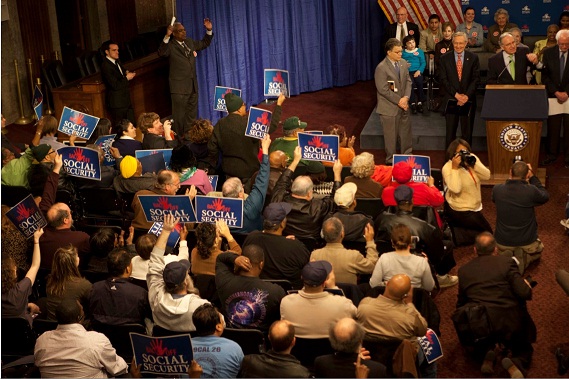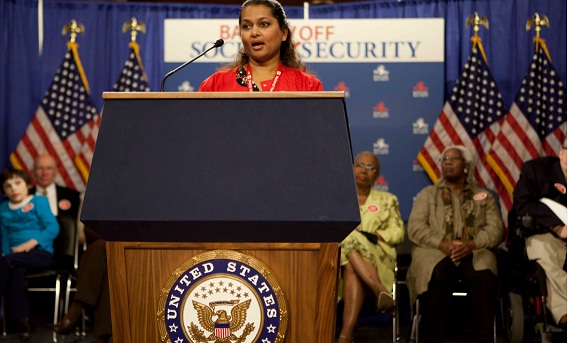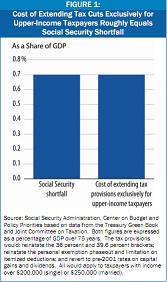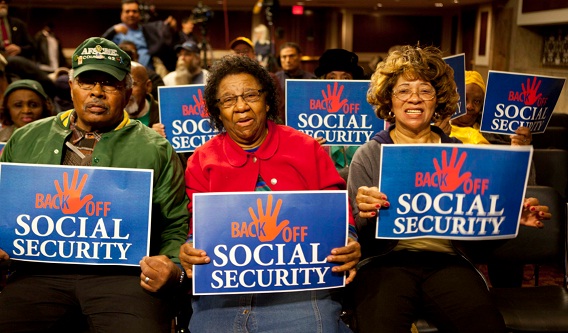No fewer than five United States senators spoke at Monday's "Back Off Social Security" rally in the Dirksen Senate Office Building. But it was the ordinary Americans on the podium and in the overflow crowd who stole the show.

Photo courtesy of Ellie Van Houtte
Nowhere was the disconnect between the bipartisan Beltway elite and working America on Social Security--and really, all budget matters--more apparent than in the personal stories and raucous cheers of real-life nurses, electricians, letter carriers, veterans, small business owners and disabled workers of all ages and colors who gathered to oppose Social Security benefit cuts on Monday in a briefing room usually reserved for the high minds of the DC think tank world.
And nowhere was it less relevant.
The audience on Monday never seemed to stop growing. Majority Leader Reid's staff brought in chairs by the dozen, cramming them into oblong rows around the TV cameras. Young people began giving up their seats for elderly couples. Attendees lined the walls and journalists crouched in the narrow aisle space to get a good view of the speakers. By the event's close, 351 people had signed the sign-in sheet alone, indicating that the real number of attendees was closer to 400, according to Social Security Works, which organized Monday's rally. (Full disclosure: I do policy research for Social Security Works.)
Labor was well represented, and the union t-shirts and caps gave the crowd a rainbow look. There were patches of AFSCME green, SEIU purple, IBEW black, NNU red, and AFGE beige tweed.
Onstage we heard from several ordinary Americans who shared how important Social Security is in their lives. All of the speeches were received with rapt attention, applause, and waving of "Back Off Social Security Signs." At particularly charged moments, the crowd showed their agreement and solidarity with cries of "That's right" and "You tell him," the likes of which one might hear at a church revival. I have never seen a crowd remain engaged for a full two hours without getting bored. It was a sign of the mutual respect and solidarity that the working Americans in the room felt for one another. There are few rallies in Washington, DC, let alone on Capitol Hill, that feel this intimate, authentic, and representative of working America.
But since there is not enough space here to recall all of the individual anecdotes, I will share the story of one person whose pithy remarks about raising the retirement age crystallized the populist spirit of the event.
Rajini Raj is a nurse in Washington, DC, and member of the National Nurses United. Rajini began by telling us that Medstar, which owns Washington Medical Center where she works, recently stopped contributing to their employees' 401(k) pension plans, making it that much harder for her to save for retirement on her modest salary. Her story was simple, but it was a microcosm of the experience of workers all over the country, whose benefits have been slashed, pay lowered and work hours lengthened, all while management continues to reap record profits. The deterioration of wages and benefits in the private sector is one reason why Social Security has never been more important.

Photo courtesy of Ellie Van Houtte
The most moving part of Rajini's story, however, was about the physical challenges of being a nurse, and her fears of raising the full retirement age. Nurses lift 1.8 tons a day, most of which is human bodies, she informed us. As a result, more than 50 percent of nurses report suffering from back pain. For many, even the early retirement age of 62 is a struggle. Rajini finished her speech with an appeal to elected officials to take her concerns to heart. "I don't want politicians who sit at a desk and make speeches all day to tell me I have to work longer," she declared to roaring applause.
By bringing home the human impact of raising the retirement age, Rajini's speech shined a light on the disconnect between Washington and the rest of the country. Raising the retirement age is the quintessential example of a policy where Washington is way out of touch with mainstream America. More than two-thirds of Americans oppose raising the full retirement age to 69, and among voters without a college education, the traditional base of the Democratic party, opposition is even higher.
Still, raising the retirement age enjoys bipartisan support in Washington. Even supposedly progressive Democrats like Dick Durbin, the No. 2 Senate Democrat, have signaled their approval for raising the retirement age. Durbin endorsed the Bowles-Simpson deficit reduction plan, which, in addition to raising the retirement age, would cut Social Security benefits for middle class workers by as much as 42%.
For the crowd at Dirksen on Monday, the injustice of such a move seemed to go beyond the policy specifics of the retirement age. Never mind that every year the retirement age is raised represents a 7% benefit cut, whether you retire at the earliest eligibility age of 62 or at the highest of 70.
Or that nearly half of Americans aged 58 or older work in physically demanding professions or difficult conditions, preventing them from working well into their 60s.
Or that workers in the lower half of the earnings distribution has experienced few gains in life expectancy at age 65, and women in the lower half have seen life expectancy at age 65 decline.
Or that elderly unemployment and age discrimination claims are at a record high.
No, Rajini's message was received so warmly at the rally because of the crowd's identification with the feeling that ordinary Americans are being ignored and abandoned by elitist politicians, who do not understand or take seriously the challenges of everyday Americans. There is something particularly blood-boiling about the spectacle of wealthy guys, who "sit at desks and make speeches all day," making Americans work longer for less.
The bank bailouts, the economic meltdown and the renewal of the Bush tax cuts for the top 2% were not the main part of the day's discussion, but there is no question that they figured prominently in the minds of the attendees. Put in this context, Social Security cuts like raising the retirement age are simply unconscionable. How can the same people who had the nerve to give enormous tax cuts to millionaires a few months ago, turn around now and ask working Americans to accept cuts to their Social Security benefits?

Raising the retirement age is often debated in Washington as if it were an abstract compromise, a sensible middle ground. But the ralliers in Dirksen were there to say, whether it's Social Security, unemployment, or tax cuts for the rich, "Your decisions matter to us. There are real people behind these policy issues and our experiences are not often part of the discussion."

Photo courtesy of Ellie Van Houtte
After the rally, the Hill returned to normal. The five Senators who spoke no doubt went back to their offices to plot partisan strategy, make fundraising calls, and argue the finer points of Planned Parenthood funding. The Beltway media returned to mocking opponents of Social Security cuts, including Majority Leader Harry Reid, as naïve people who just don't "get" the nuances of the Social Security issue.
But for just a couple hours during that rally, there was no Beltway bubble. It was just a bunch of Americans exercising their democratic rights to assemble peacefully and make their voices heard on an issue that matters to them. And for a couple of hours, anyway, they had a receptive audience.
